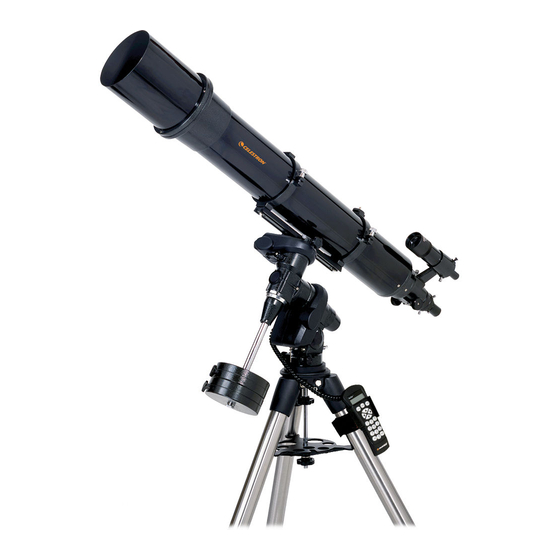Celestron NexStar 8i 부록 - 페이지 2
{카테고리_이름} Celestron NexStar 8i에 대한 부록을 온라인으로 검색하거나 PDF를 다운로드하세요. Celestron NexStar 8i 5 페이지. Celestron nexstar 8i: product manual
Celestron NexStar 8i에 대해서도 마찬가지입니다: 통신 프로토콜 매뉴얼 (8 페이지)

Your Celestron NexStar 8i Special Edition now comes with many new enhanced features including the patented
SkyAlign alignment procedure. SkyAlign is the easiest way to get your NexStar aligned and ready to observe. Even if
you do not know a single star in the sky, the NexStar will have you aligned in minutes by asking for basic information
like the date, time and location. Then you simply need to aim the telescope to any three bright celestial objects in the
sky. Since SkyAlign requires no knowledge of the night sky it is not necessary to know the name of the stars at which
you are aiming. You may even select a planet or the moon. The NexStar is then ready to start finding and tracking any
of the objects in its 40,000+ object database.
In addition to SkyAlign, the NexStar has other advanced features like SolarSystem align, One-Star Align and added
functions like Sun Menu, Scrolling Menu and Constellation Tour.
Please use this addendum in conjunction with your owner's manual as reference for all your telescope's new and
existing features. To download a copy of the most current manual for this telescope, please go to the NexStar i series
product page at www.celestron.com
A
l
i
g
n
m
e
n
t
P
r
o
c
e
d
u
r
e
A
l
i
g
n
m
e
n
t
P
r
o
c
e
d
u
r
e
In order for the NexStar to accurately point to objects in the sky, it must first be aligned to known positions (stars) in
the sky. With this information, the telescope can create a model of the sky, which it uses to locate any object with
known coordinates. There are many ways to align the NexStar with the sky depending on what information the user is
able to provide: SkyAlign uses your current date, time and city to create an accurate model of the sky. Then the user
can simply point the telescope to any three bright celestial objects to accurately align the telescope with the sky. One-
Star Align is the same as the Two-Star Alignment method described in your owner's manual, however only requires
you to align to one known star. Although not as accurate as the other alignment methods, One-Star Align is the
quickest way to find and track bright planets and objects in Altazimuth mode. Finally, Solar System Align will display
a list of visible daytime objects (planets and the moon) available to align the telescope. Each alignment method is
discussed in detail below.
Definition
"Altazimuth" or "Alt-Az" refers to a type of mounting that allows a telescope to move in both altitude (up and down) and
azimuth (left and right) with respect to the ground. This is the simplest form of mounting in which the telescope is attached
directly to a tripod.
S
k
y
A
l
i
g
n
S
k
y
A
l
i
g
n
SkyAlign is the easiest way to get your NexStar aligned and ready to observe. Even if you do not know a single star in
the sky, the NexStar will have you aligned in minutes by asking for basic information like the date, time and location.
Then you simply need to aim the telescope to any three bright celestial objects in the sky. Since SkyAlign requires no
knowledge of the night sky it is not necessary to know the name of the stars at which you are aiming. You may even
select a planet or the moon. The NexStar is then ready to start finding and tracking any of the objects in its 4,000+
object database. Before the telescope is ready to be aligned, it should be set up in an outside location with all
accessories (eyepiece, diagonal and finderscope) attached and lens cover removed as described in the Assembly section
of the manual. To begin SkyAlign:
1.
Power on the NexStar by flipping the switch located on the side of the fork arm, to the "on" position. Once
turned on the hand control display will say NexStar SE. Press ENTER to choose SkyAlign. Pressing the
ALIGN key will bypass the other alignment options and the scrolling text and automatically begins Sky
Align.
2.
Once SkyAlign has been selected, the hand control will display "Enter if OK", "Undo to edit" and "Saved
Site". The bottom line of the LCD will display either the current time or the time when you last used the
telescope. Since this is your first time using the NexStar , press UNDO to enter current time/site information.
The hand control display will then ask for the following information:
Location - The NexStar will display a list of cities to choose from. Choose the city from the database that is
closest to your current observing site. The city you choose will be remembered in the hand controls
memory so that it will be automatically displayed the next time an alignment is done. Alternatively, if
2
